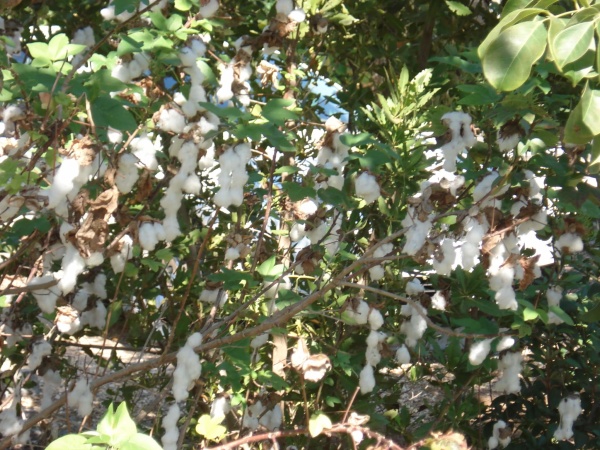
Why organic cotton matters? Regular cotton vs organic cotton
Do you know what you’re wearing? Is your conventional cotton t-shirt tainted with chemicals?
If you look through your closet, you're probably going to find that a majority of your clothing is at least partly made of cotton. Cotton is the most commonly used natural fiber on the planet. People like cotton because it’s not only breathable and durable, but it’s also easily obtainable and inexpensive. According to WWF[1], approximately half of all textiles are made of cotton. While cotton is a natural fiber, which means it isn't causing pollution in the same way man-made fabrics do, it does come with its own set of problems. Conventional cotton is not only damaging to the environment, it is also bad for our health, and detrimental to the workers who produce it.
Conventional Cotton Production - why is cotton bad for the environment
The problem with conventional cotton production is that it’s one of the most chemically intensive crops in the world. Regular cotton is the most heavily pesticide sprayed crop. It uses a massive 16%[2] of the world’s insecticides. Many of these harsh chemicals and toxic pesticides linger on the fabric, eventually making contact with our skin. Agricultural production, processing, trade and consumption also contribute to the rising greenhouse gases in our atmosphere.
Besides the heavy use of pesticides, cotton production also requires massive amounts of freshwater. This poses a problem because cotton is often grown and produced in places where not everyone has access to clean, potable water. The diversion of water from local water supply systems has a massive impact, not only on the local ecosystem, but also contributes to water scarcity in certain parts of the world.
In addition to negative environmental impacts, conventional cotton production poses serious health, economic and social risks. In addition to harsh working conditions, workers in conventional cotton fields are exposed to harmful pesticide residue[3] which is used in conventional cotton farming.
Why Organic Cotton is Better
Hand holding some white organic cotton
At its heart, organic cotton is really about working with, rather than against nature. It relies on the natural systems and processes of nature, rather than on artificial pesticides or synthetic fertilizers to control pests and to build soil fertility.
Organic cotton is much better for the environment. The agricultural process is more sustainable, by using up 91% less water in the growing process[4], and banning the use of toxic pesticides and chemicals. It also doesn’t allow for the use of GMO seeds. Organic cotton farming also emits 46% less greenhouse gases[5] than conventional cotton production.
Rather than use harmful pesticides, organic cotton cultivation relies on organic pest management[6] strategies to prevent pests from even becoming a problem.
Certified organic cotton is also better for overall human health and well-being. It’s fairly traded because it’s highly regulated. This assures safe working conditions, employee protections, and fair wages, which help cotton workers support their families.
Finally, organic cotton results in better quality clothing, which is more durable and feels more comfortable. The threads of organic cotton are stronger since they have not been damaged or broken down by harsh chemicals used in the production process. This means that they will typically last longer than convention cotton garments.
Your Purchases Matter
Every time you make a purchase, you have the power to use your money to make a statement. You can either choose to maintain the status quo or direct the world toward a better future. Whether you’re shopping in a physical store or online, pay close attention to what materials are used in the clothing you buy. However, just looking for textiles marked as organic cotton may not be enough. In order to be sure, you’re buying clothing from sustainable textiles, look for the GOTS certification. The GOTS certification not only ensures that the cultivation of the cotton in your clothing meets high-level environmental criteria, it also covers, processing, manufacturing, packaging, labeling, trading and distribution. This way, you can be certain your purchases are not only made from organic cotton, but also were manufactured and distributed in a fair and ecological way. The GOTS certification covers the entire supply chain.
The Global Organic Textile Standard (GOTS) is an internationally recognized organic textile standard which ensures that the entire textile supply chain has met strict standards. It guarantees the organic status from the cultivation and harvesting of the raw materials, through environmentally and socially responsible manufacturing, all the way to labeling, in order to provide guarantees to the consumer.
Overall, organic cotton is the most sensible, environmentally-friendly choice.
The entire Mudita Togetherness Collection is certified organic by GOTS, which means that it meets the highest ecological and social standards.
Read also: How to lead a more sustainable, eco-friendly lifestyle.
Related stories

What Other Countries Can Teach Us About Minimalism
Global insights on minimalism. Discover how different cultures use minimalism & essentialism to create a fulfilling life focused on values over possessions.

Breathing in Spring: The Health Benefits of Fresh Air
Fresh air, a simple yet powerful element of the natural world, has the ability to heal us on physical, mental and spiritual levels.

Get Organized: 10 Minimalist Rules for a Clutter-Free Home
In the world of minimalist interior design, less is always more.
If you'd like to receive the best stories from our blog, keep up to date with our progress and get notified about our product releases and special discounts.